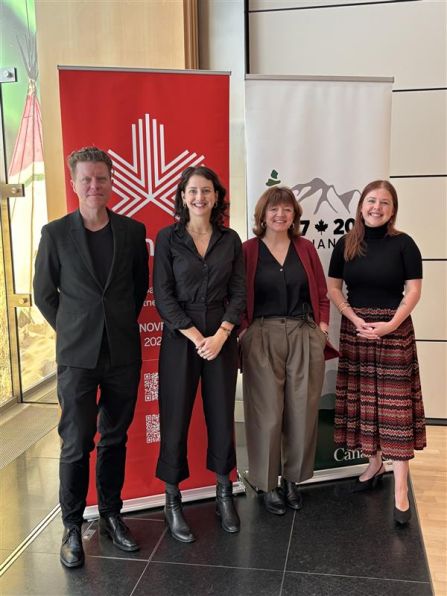
On 19 March 2025, the Clean Economy Bridge organized the event Carrying the Baton: Youth-led Transatlantic Collaboration on the Clean Economy. Hosted by the Canadian Embassy and taking place on the sidelines of the Berlin Energy Transition Dialogue, the breakfast event offered the opportunity to hear fresh perspectives on the role youth and civil society can play in advancing the transition to a clean economy.
The event opened with words of welcome from Evelyne Coulombe, Chargée d’Affaires a.i. Embassy of Canada to Germany, Berlin, and Charlotte Cuntz-Campbell, Acting Deputy Head, Division for Climate Partnerships and bilateral Climate Cooperation, German Federal Foreign Office. Helen Watts, Executive Director Student Energy, the world’s largest youth-led energy organization, with chapters in Canada and the US, and Prof Dr. Andreas C. Goldthau, Director of the Willy Brandt School of Public Policy, University of Erfurt, then joined Mary Hellmich, consultant and head of the Clean Economy Bridge at adelphi, on stage for a moderated panel discussion, followed by questions from the audience.
Key themes included:
Young people need to have a strong voice in shaping the transition to a clean economy – for both ethical and practical reasons
As 25 percent of the world’s population and those set to inherit the results of our actions today, youth are key stakeholders in the transition and as such have played an important role in advocating for the transition to a clean economy. All the speakers saw huge energy and potential among young people to support cross-cutting, innovative solutions, and emphasized that the need to empower them as the future leaders and innovators that will deliver the clean economy in the decades to come. Both panelists also emphasized the huge diversity of the youth movement and how the young people they encountered often felt both deeply connected to their local communities and part of the global climate movement through social media and other networks.
Young people need genuine career opportunities and pathways to become the changemakers of tomorrow
The discussion acknowledged the unsustainability of unpaid climate activism. As Prof. Goldthau noted, "endless internships" must give way to meaningful career pathways that allow young people to become changemakers within the organizations and institutions shaping the transition. Helen Watts also reflected that "young people don't have endless energy to ring alarm bells" and need roles where they can channel their passion into tangible contributions to the transition.
Both emphasized the value of experiential learning in this context. Prof. Goldthau talked about his school’s “service-based learning” approach that aims to show students the value of their diverse backgrounds for understanding the transition to a clean economy in different contexts, and to build their confidence by providing opportunities to apply their knowledge and skills to real policy problems. He called for educational institutions to open doors and provide space and mentoring for student-led initiatives. Speaking to her experience, Helen Watts highlighted Student Energy's career training programs that aim to builds leadership and employability skills through experiential learning opportunities with leading energy companies. Cities and subnational governments were also seen as providing crucial entry points for youth to meaningfully engage in transition processes, given the many examples of youth councils being established to inform local policies.
In times of political polarization, find ways reach out beyond our bubble is crucial
Responding to the issue of increasing fraught discussions and political polarization around climate, and the increasing numbers of young people voting for far-right parties, both panelists and audience members discussed ways to reach out beyond the climate and clean energy bubble. Helen Watts stressed the need to listen and “meet people where they are” when debating the issues, pointing to how the Alberta Narratives project had developed more inclusive narratives to promote the clean economy. Thinking about universities, she emphasized the need to engage with different types of campus organizations and adapt communication approaches for different contexts—using social media effectively and supporting in-person community engagement. The discussion also reflected on the powerful examples of indigenous leadership shared at the SevenGen Indigenous Youth Energy Summitand the need to find more ways to speak through popular culture, building on the examples of Billie Eilish, AY Young and others.
